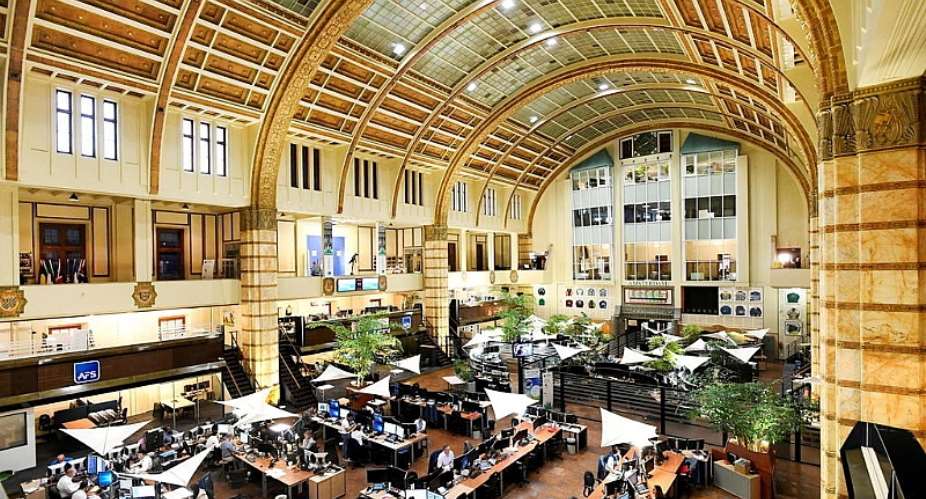The European Parliament is preparing to finalise Brexit by ratifying the EU's trade deal with Britain, which makes no provision for financial services. As financial companies are leaving the City of London, the Paris stock exchange and others across Europe have been getting a boost – with Amsterdam emerging as Europe's largest trading centre.
EU Parliament is expected Tuesday evening to give the final approval of the deal, in which there will be no tariffs or quotas on goods traded between the EU and UK.
The vote on the deal, which has been delayed and provisionally applied since 1 January, does not address foreign policy or defence, nor any environmental, health or other regulatory commitments, which would have required some customs checks and paperwork that would slow down business.
It also does not address financial services, a driver of the British economy, with the City of London as Europe's headquarters for banking and investment.
Financial services excluded
British Prime Minister Boris Johnson decided he wanted "a run-of-the-mill free trade agreement", explains John Springford, deputy director of the Centre for European Reform in London.
"Banks can blow up, so close trade relationships in financial services require common regulations, which Johnson didn't want," he said.
In March, the EU and the UK agreed to create "the framework for voluntary regulatory cooperation in financial services", which means each side will work on limiting regulatory barriers to financial trading, but each can make decisions unilaterally.
"The UK might voluntarily say that, for example, EU-based investment banks can sell to UK clients. But they also might not," says Springford.
"All the signs are that the EU is not going to let the City of London continue to provide many services over the border by granting such equivalence, so banks, funds and other City-based firms have shifted a fair amount of activity into the EU."
Banking moves to the EU
As Brexit got underway, international banks had already decided to relocate to other European countries and strengthen their European operations to smooth the transition when Britain left the customs union.
Since Brexit negotiations started in 2019, some 440 financial services firms based in the UK have relocated at least part of their business, staff or legal entities to the EU, according to the New Financial, an industry-funded UK-based think tank.
The group analysed the impact of Brexit on the City, and identified more than £900 billion (€1.04 billion) in bank assets that have been moved, representing about ten percent of the British banking system. Insurance and asset management firms have also transferred more than £100 billion (€115 billion) in assets and funds.
“As the EU takes a tougher line on the location of activity and individuals we expect these headline numbers to increase in future,” warns the study.
Amsterdam becomes stock market leader
Paris has attracted many of the companies, though Dublin has emerged as the leader, attracting many asset management companies. Frankfurt has attracted banks, and Amsterdam has drawn in trading platforms and exchanges.
"Two big stock exchanges, the London Stock Exchange Group and Cboe Global Markets picked Amsterdam as their home after Brexit," says Springford.
The decisions drew others, and in January Amsterdam became Europe's largest share trading centre, pushing London's City into second place.
In the past month, the Amsterdam stock exchange has been hitting record highs, with daily trading increasing from €2.6 billion to €9.2 billion in January, while trading in London was halved, from €17.5 billion to €8.6 billion, according to the Cboe exchange, which operates in both cities.
But the City will remain Europe's largest financial centre in the foreseeable future.
"The City has some global specialisms, like foreign exchange trading, fintech and derivatives, that are relatively unaffected by Brexit," says Springford.
"Over time, it's likely that the EU will seek to tighten the screws further, bringing more City-based activity into the bloc. This is likely to be a continuing source of tension between the UK and the EU over the next decade."





 Burkina Faso expels French diplomats for 'subversive activities'
Burkina Faso expels French diplomats for 'subversive activities'
 GOIL reduces petrol price by 29 pesewas, sells GHC14.70 per litre
GOIL reduces petrol price by 29 pesewas, sells GHC14.70 per litre
 The disrespect towards security is terrible; we can do better — Atik Mohammed co...
The disrespect towards security is terrible; we can do better — Atik Mohammed co...
 Starlink to cease connection in Ghana, other “unavailable” countries on April 30...
Starlink to cease connection in Ghana, other “unavailable” countries on April 30...
 MMCEs, DCEs and Regional Ministers must be elected to reduce political interfere...
MMCEs, DCEs and Regional Ministers must be elected to reduce political interfere...
 National Cathedral: ‘Nonsense; you take taxes from broke Ghanaians to dig a clum...
National Cathedral: ‘Nonsense; you take taxes from broke Ghanaians to dig a clum...
 April 18: Cedi sells at GHS13.59 to $1, GHS13.01 on BoG interbank
April 18: Cedi sells at GHS13.59 to $1, GHS13.01 on BoG interbank
 We must harness the collective power and ingenuity of female leaders to propel o...
We must harness the collective power and ingenuity of female leaders to propel o...
 Saglemi Housing Project will not be left to rot – Kojo Oppong Nkrumah
Saglemi Housing Project will not be left to rot – Kojo Oppong Nkrumah
 Asantehene commends Matthew Opoku Prempeh for conceiving GENSER Kumasi Pipeline ...
Asantehene commends Matthew Opoku Prempeh for conceiving GENSER Kumasi Pipeline ...
